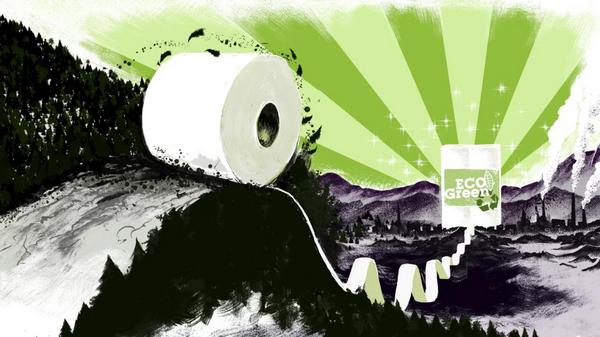Does veganism help?

The term ‘greenwashing’ is often used to describe attempts, often by big companies, to convey the false impression that their goods are produced in an environmentally friendly and sustainable way – and this sometimes with a view to distracting attention from their involvement in other environmentally damaging practices. Some, in fact, see the whole of the current ‘green’ agenda as, under cover of support for the environment, actually extracting from it resources it cannot afford to lose and, no matter how good the intentions of the ‘deep’ or ‘bright’ greens, as no more than a sop to capitalism’s growth. This consists of regarding the Earth only as a target for producing goods for sale on the market and of being unable by its nature to do other than subordinate real care for flora, fauna and climate to the imperatives of growth and production for profit. In the words of one writer: ‘Our way of life doesn’t need to be saved. The planet needs to be saved from our way of life’ .
Plant-based
As part of ‘greenwashing’ in production and consumption via various ‘green’ solutions (eg, solar panels, wind turbines, green energy storage, recycling, LED lights, electric cars, hydropower, biomass, geothermal energy, etc.), some now add a particular lifestyle often presented as a way to reduce climate change and human impact on the environment: plant-based eating or veganism. In a recent article in Monthly Review entitled ‘The Case for Socialist Veganism’ , Benjamin Selwyn and Charis Davies point to the fact that many of the companies and corporations that have embraced the plant-based market use this as ‘cover’ for the damaging environmental impact they cause with their other production (‘meat, dairy and other environmental ruinous activities’). This, they say, represents ‘attempts at corporate brand greenwashing’ and is aimed at continued expansion of their sales and markets. It includes fast-food chains such as McDonald’s and Burger King, whose products are still overwhelmingly meat-based but who have developed plant-based product lines in an attempt to cash in on growing concerns for the environment or animal welfare. A chart the authors have put together demonstrates that plant-based brands not readily associated with big corporations often turn out to be owned by large non-vegan parent companies (e.g. Vivera by JBS, the world’s largest meat company; the Vegetarian Butcher by Unilever; Alpro by Danone, one of the biggest dairy companies in the world). And all these companies continue to have a massively damaging environmental impact in such areas as support for deforestation, mass-scale meat and dairy production, high levels of plastic pollution and damage to natural water sources. So JBS, while promoting Vivera under the flag of promoting ‘the wellbeing of the planet’, slaughters 8.7 million birds, 92,600 hogs and 42,700 head of cattle every day of the year, thus making an appreciable contribution to climate breakdown via deforestation, greenhouse gases from cattle and cultivation of massive quantities of feed crops. Unilever, for its part, was, in 2022, named as one of ‘the top ten global polluters’, and Danone too is a leading plastic polluter and, despite its stated aim to encourage ‘healthy eating trends’, is largely focused on cow’s milk production, which produces three times more greenhouse gas emissions than plant-based milk and, like for like, uses ten times more land.
The charge here is that, however much veganism may have the potential to reduce human impact on the environment, the relative monopoly held by the big food producers makes that impossible. Focused as they are on animal-based production, any positive effect of vegan production is likely to be small and may in fact be negated completely if it simply increases the profits and investment power of the big producers and so aids their continuing focus on producing meat and milk as cheaply as possible, and so paradoxically increasing animal suffering and exploitation.
An ethical marriage?
 So what to do? The solution which the authors of this article propose is to move the food system towards what they call ‘socialist veganism’, also described as ‘an ethical marriage between veganism and socialism’. This, they tell us, would involve the hundreds of billions of dollars currently spent on so called ‘green transitioning’ being directed towards what they call ‘an ecosocially transformative political-economic agenda’. This, they maintain, will help to ‘shift the balance of class power away from capital to labor’ and can be achieved, as they see it, via movements ‘from below’, largely, that is, through collective action by unionised workers to ‘alter the balance of class power between capital and labor in favor of the latter’.
So what to do? The solution which the authors of this article propose is to move the food system towards what they call ‘socialist veganism’, also described as ‘an ethical marriage between veganism and socialism’. This, they tell us, would involve the hundreds of billions of dollars currently spent on so called ‘green transitioning’ being directed towards what they call ‘an ecosocially transformative political-economic agenda’. This, they maintain, will help to ‘shift the balance of class power away from capital to labor’ and can be achieved, as they see it, via movements ‘from below’, largely, that is, through collective action by unionised workers to ‘alter the balance of class power between capital and labor in favor of the latter’.
The kind of development they see as necessary is an extension of ‘welfare provision’, through which ‘services are provided across an expanding array of social life as part of the transformation and increasing equalization of society’, and what they call a ‘decommodification of food’. This would mean, they say, that ‘food production itself could be increasingly brought under democratic control by workers, their communities, and consumers’. And this would be part of a ‘broader process of managed degrowth’ and ‘a socialist green transition’, which would include, in the words they quote of John Bellamy Foster, ‘growth in such areas as regenerative agriculture, food production, decent housing, clean energy, accessible health care, universal education, community welfare, public transportation, digital connectivity, and other areas related to green production and social needs’.
They also have other indisputably admirable ambitions, such as various alternatives to chemical-intensive farming assisted in part by use of computerisation and robotisation, hydroponics with plants growing without soil in vertical farms, and precision fermentation producing a whole range of tasty foods that mimic meat and milk products but do not come from animals. Precision fermentation could, we are told, ‘produce the same amount of protein as soy production does in the United States on 1,700 times less land’, which in turn ‘could, through reducing cropland, enable large-scale rewilding (to expand the world’s carbon sinks and restore the diversity of plant and animal species), through restoration of grasslands, wetlands, forests, and savannas’. Part of this transformation would, as the authors see it, allow ‘animals to be raised in more compassionate and ecologically sound ways’, and ‘with reductions in the role of meat in the overall Western diet’. So, the authors, while having a soft spot for veganism, do not necessarily advocate its universal adoption. They say, rather, that ‘vegan food production can, through decommodification and democratization of social life, contribute to providing good quality and affordable food for the many, mitigating climate breakdown, and contributing to mending the metabolic rift’.
Powers of government
Overall, an extremely positive and optimistic case is made by these authors for what they term ‘socialist managed degrowth’, even if, with its only ‘partial’ veganism, it is not what many socialist vegans, especially if coming from an ethical standpoint and favouring universal veganism, would want to hear. But it’s also a proposition that needs to be looked at through the lens of the operating procedures of the society we live in and of what it will take to move to the different operating procedures of a socialist society. Two beliefs seem to underlie the picture painted by the authors. The first one is that the shift to a different kind of society can take place bit by bit via a series of struggles by workers who gradually impose on governments their demands for greater fairness and more equality. The second belief is that governments have the power to bend and flex at will the capitalist system they administer and regardless of the profit imperative that underlies it. For all the good intentions of the authors, these beliefs are untenable, since the role of governments is to be the executive committee of the small class of people who own the productive forces, against whom they cannot act in any substantive way. It’s true that governments sometimes can and do intervene in the running of the system in the wider interests of its survival, such as in the case of America’s ‘New Deal’ of the 1930s (referred to in some detail here by these writers) and in the recent Covid crisis. But they do that to keep the system working not to make it fairer or more equal, even if sometimes reforms they bring in may turn out to give some relief to those suffering most from its effects. But they simply cannot regulate to their heart’s content the system of production for profit and buying and selling.
Tweaks or consciousness?
So what needs to happen to establish the kind of society that no doubt the authors of this article would ultimately want to see – a leaderless, stateless, marketless society which will recognise the necessity to produce and distribute sustainably while being sensitive not just to the needs of the human species but to the whole environment of which we are a part, including its geology and its flora and fauna? What needs to happen is not just some tweaks to the way we live and work today brought about by pressure on governments (which would usually be reversible anyway) but the growth of a democratic movement expressing a majority will of the world’s people which will win control of political power, probably via the ballot box, and then collectively organise that new society. This can only happen of course once the necessary spread of consciousness has been achieved and plans to democratically organise that society are in place. It will then be up to that conscious majority to make all sorts of choices about how they live, including whether humans should continue using animals for food and other purposes and, if so, how and to what extent.
HKM
Next article: Socialism through the looking glass, or wage-labour as liberation ➤
One Reply to “Does veganism help?”
Leave a Reply
You must be logged in to post a comment.

Just a bit of fun. A Socialist Standard article from 1951 entitled, The World and the Vegans:
https://socialiststandardmyspace.blogspot.com/2017/02/the-world-and-vegans-1951.html